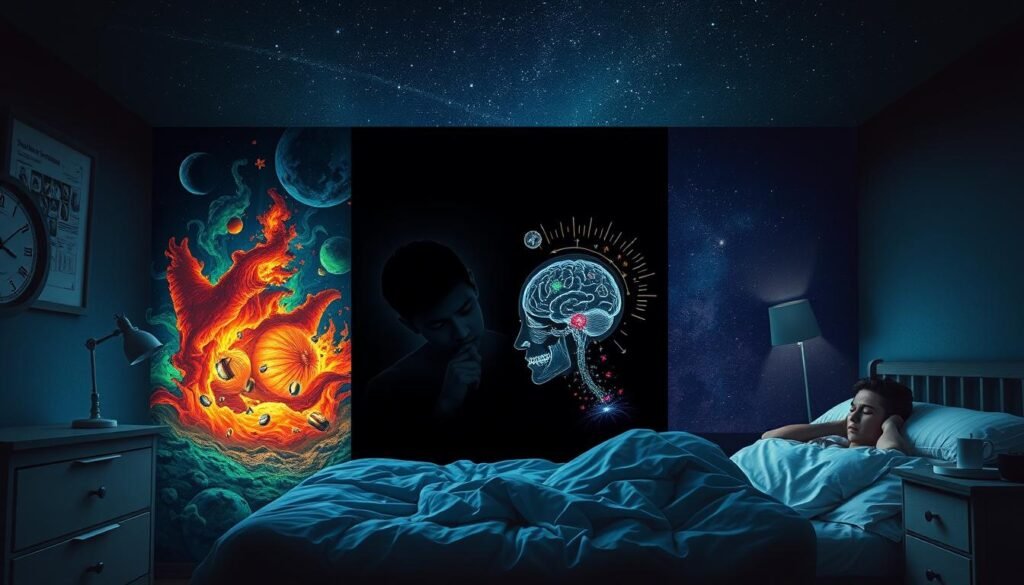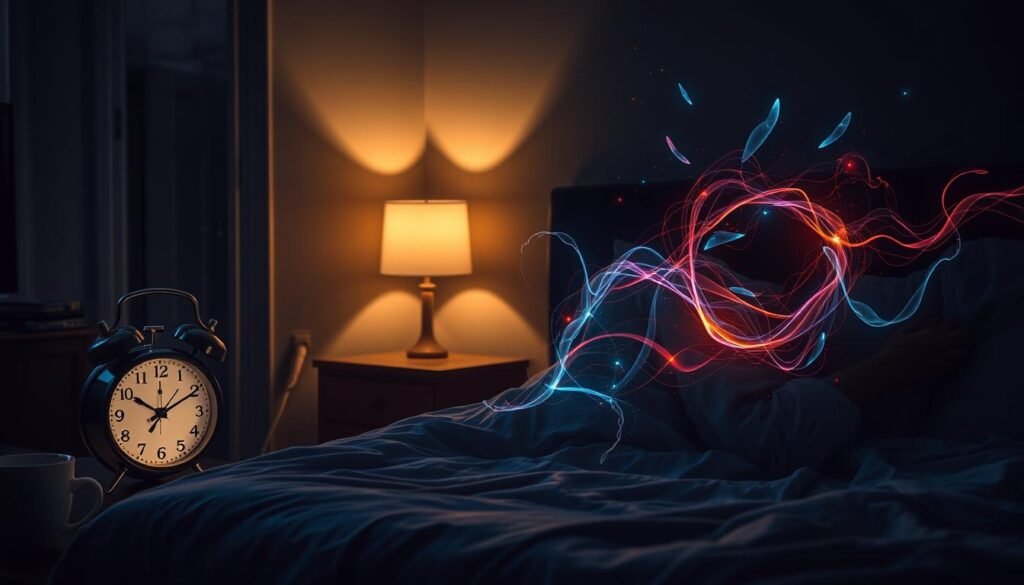Did you know about 30% of adults have trouble sleeping at some point? This fact highlights a big health issue. Insomnia isn’t just annoying. It can hurt your work and make accidents more likely. We will look at what causes insomnia, including stress, health problems, and how we live. It’s key to know these causes to find good treatments and help people sleep better.
Key Takeaways
- Insight into the prevalence of insomnia among adults.
- Understanding short-term vs. chronic insomnia.
- Recognizing symptoms and risk factors of insomnia.
- The impact of lifestyle choices on sleep quality.
- Medical conditions and medications that may affect sleep.
Understanding Insomnia
Insomnia makes it hard to sleep well, affecting daily life. Over 25% of Americans struggle to sleep sometimes. Meanwhile, nearly 10% have chronic insomnia. This disorder can last a short or long time. Acute insomnia is brief and often caused by stress. Chronic insomnia lasts more than three months and happens often. Knowing the types of insomnia can help find the right solution.
Many things lead to insomnia, like stress, health issues, and noise. It’s important to notice the signs of insomnia. These signs include trouble falling or staying asleep and feeling tired during the day. You might also feel moody or not interested in activities.
Since insomnia might point to bigger health problems, it’s key to deal with its causes. Making changes to your lifestyle and trying cognitive-behavioral therapy (CBT-I) can make sleep better. There are also medicines, but they might cause dependency or other issues.
To learn more about insomnia’s signs and how to treat it, visit MedlinePlus.
What is Insomnia?
Insomnia is a common sleep disorder that many people face. It involves trouble with falling asleep, staying asleep, or waking up too early. Unfortunately, it also means not being able to go back to sleep easily. This issue can really mess up someone’s day, making them very tired, easily upset, and less sharp.
There are two types of insomnia: acute and chronic. Acute insomnia is short, lasting just a few days or weeks. Chronic insomnia is more serious, happening at least three nights a week for over three months. People at higher risk include older adults, those with family members who have insomnia, and workers on night shifts. Bad habits with caffeine, nicotine, and alcohol also play a role.
Too much time on phones or computers before bed can increase the risk of insomnia. If sleep problems continue, it’s important to see a doctor. They use specific guidelines to figure out if someone has insomnia, focusing on how often and how long the sleep issues occur.
It’s crucial to understand that insomnia does more than just ruin sleep. It can harm school or work performance and lower quality of life. The condition is complex, combining mental and body health issues. Therefore, it’s key to treat both sides to effectively manage insomnia.
Common Symptoms of Insomnia
Insomnia affects many people. It’s key to know the common symptoms of insomnia if you’re having trouble sleeping. Many suffer from not being able to fall asleep, or wake up and can’t go back to sleep. This leads to feeling very tired during the day, making people irritable or moody.
Other signs include trouble focusing, memory problems, and more worry about sleep. These issues impact about 1 in 3 adults. This means around 18 million Americans are trying to deal with these sleep problems. Knowing and addressing the signs of insomnia is crucial.
Sometimes, short-term sleep issues can turn into long-term insomnia. This is when you have symptoms for three months or more, for at least three nights a week. It causes distress because of not sleeping well. This, along with feeling tired in the day, can make a cycle of fatigue and worry.
Improving sleep habits is important to beat insomnia. Stick to a regular bedtime, make sure your sleeping area is comfy, and try relaxing before bed. If you’re looking for ways to deal with sleep anxiety, check out resources like this helpful guide.
| Symptom | Description |
|---|---|
| Difficulty falling asleep | Struggling to initiate sleep, often for extended periods. |
| Frequent awakenings | Waking up multiple times during the night, disrupting sleep continuity. |
| Early morning awakenings | Waking up earlier than planned and being unable to return to sleep. |
| Daytime fatigue | Feeling exhausted or sluggish throughout the day due to poor sleep quality. |
| Cognitive impairment | Experiencing issues with memory and concentration. |
| Irritability | Feeling unusually moody or grumpy as a result of sleep deprivation. |
Possible Causes for Insomnia
It’s crucial to know why people can’t sleep well. Many things can make sleeping hard, and this can lead to ongoing insomnia. Stress is often a big factor that affects both mind and body.
Stress and Life Events
Stress has a big impact on how well we sleep. Things like work problems, issues in relationships, or big changes can lead to trouble sleeping. Being stressed over time can keep you alert, making it hard to relax and sleep.
Mental Health Disorders
About 40% of those who have trouble sleeping are dealing with mental health issues. Anxiety and depression don’t just mess with sleep; they can make existing problems worse. This creates a tough cycle that’s hard to get out of.
Poor Sleep Habits
Bad habits at bedtime really affect how good your sleep is. Not sleeping at the same time every night, using screens before bed, and having a bad sleeping space can cause insomnia. To fix this, try to stick to a sleep schedule and make your bedroom better for sleeping.

| Factor | Impact on Sleep |
|---|---|
| Stress | Increases anxiety and can lead to chronic insomnia |
| Mental Health Disorders | Worsens sleep quality and frequency of insomnia symptoms |
| Poor Sleep Habits | Results in irregular sleep patterns and decreases overall sleep quality |
Impact of Stress on Sleep
Stress greatly affects sleep, often causing serious sleep problems. Stress and insomnia go hand in hand, making it challenging to relax and fall asleep. This increases the chances of poor sleep.
Lack of sleep can harm health, slowing down metabolism and causing hormone issues. Getting 7 to 9 hours of sleep a night is best for health. High stress makes insomnia more common, hurting your daily life and raising the risk of accidents.
Stress not only makes falling asleep harder but also breaks up sleep by making the body more alert and increasing cortisol. Studies show that a big fraction of adults suffer from insomnia, which leads to problems during the day.
People with insomnia often use things like melatonin to help. Keeping a regular sleep schedule helps tune your body’s clock for better sleep. Long-term stress can cause sleep problems, affecting overall health.
| Factors Related to Stress and Insomnia | Symptoms |
|---|---|
| High Stress Levels | Difficulty falling asleep |
| Chronic Stress | Frequent awakenings at night |
| Persistent Stressors (e.g., work issues, personal conflict) | Daytime impairments |
| Acute Stress Encounters | Panic or dread sensations |
| Consistent Sleep Schedule Disruptions | Fragmented sleep quality |
To deal with stress and sleep better, it’s important to understand their link. Activities like mindfulness and exercise can reduce stress’s impact, leading to better sleep.
Anxiety Disorders and Insomnia
About 20% of American adults are affected by anxiety disorders, which greatly impacts their sleep. Insomnia is often seen in those struggling with these conditions. Generalized Anxiety Disorder (GAD) affects 3.1% of the U.S. population. It can keep minds racing at night, making relaxation difficult.
Panic Disorder and Social Anxiety Disorder disrupt sleep for 2.7% and 7.1% of adults, respectively. This makes it hard to keep a regular sleep pattern.
There’s a strong link between anxiety disorders and insomnia, creating a hard-to-break cycle. Those with insomnia may grow even more anxious about not sleeping enough. This makes their anxiety worse. Over 90% of people with PTSD from combat face insomnia, showing how deep anxiety can affect sleep. Also, nearly half of those suffering from depression deal with anxiety too. This shows the complex challenges they face.
Treatments like Cognitive Behavioral Therapy (CBT) are effective in easing anxiety and improving sleep. CBT for insomnia changes harmful thought patterns and behaviors that affect sleep. Good sleep habits also help lessen anxiety about sleeping. Such habits include a consistent sleep schedule and a calming bedtime routine. Tackling mental health issues with professional help can make a big difference in managing insomnia and anxiety.
| Anxiety Disorder | Prevalence |
|---|---|
| Generalized Anxiety Disorder (GAD) | 3.1% |
| Panic Disorder | 2.7% |
| Social Anxiety Disorder | 7.1% |
| Specific Phobias | 9.1% |
| Obsessive-Compulsive Disorder (OCD) | 1.2% |
| Post-traumatic Stress Disorder (PTSD) | 3.6% |
The Role of Depression
Many people with depression and insomnia are caught in a tough cycle. Sleepless nights make depression symptoms worse. Studies show that people with insomnia are ten times more likely to get depressed than those who sleep well. Around 75% of depressed individuals have trouble sleeping.
The link between insomnia causes and anxiety is strong. Daytime worries often lead to waking up at night. About 40% of people with insomnia might also be dealing with depression. Plus, up to 80% of those with depression have trouble sleeping. This shows how important it is to find the right treatments.
Waking up early is another sign of depression. It greatly affects mental health. Sticking to a regular sleep schedule and exercising can help. Adding cognitive behavioral therapy for insomnia (CBT-I) to depression treatment can improve sleep and mood.
This approach shows how connected sleep issues are to managing mental health. Treating depression can make sleep better, easing both depression and insomnia. It’s crucial to address these linked conditions for better sleep and overall health.
Strategies for managing insomnia and depression provide more tips for overcoming these challenges.
| Condition | Impact on Sleep |
|---|---|
| Depression | 75% struggle with sleep |
| Insomnia | Higher risk of depression |
| Sleep Apnea | 5x higher risk of depression |
| CBT-I Treatment | Improves sleep patterns |
| Healthy Sleep Habits | Boost mood and decrease symptoms |
Medical Conditions Linked to Insomnia
Many medical conditions can badly affect how well you sleep, often leading to insomnia. Understanding the link between these conditions and sleep can help with better management. Conditions like chronic pain, sleep apnea, and GERD are key issues.
Chronic Pain
Living with chronic pain makes it hard to sleep well. Conditions such as arthritis and fibromyalgia cause discomfort that makes finding a comfy position to sleep hard. This often leads to trouble falling asleep and waking up many times at night.
People getting treated with steroids may find they can’t sleep well, too.
Sleep Apnea
Sleep apnea causes you to stop breathing over and over while sleeping, wrecking a good night’s rest. It leads to waking up often and feeling tired during the day. It’s also linked to heart problems.
Those with sleep apnea usually have trouble sleeping because of these issues.
Gastroesophageal Reflux Disease (GERD)
GERD is linked with insomnia too. The discomfort from nighttime heartburn can make sleep hard. Studies show many with stomach problems also have trouble sleeping.
Dealing with these conditions can help improve sleep and overall health.

Effects of Medications on Sleep
Many people don’t realize how medications affect their sleep. Insomnia medications and some prescription drugs can change normal sleep cycles, causing problems. For example, heart medications like alpha-blockers and beta-blockers may lead to feeling sleepy during the day. Meanwhile, SSRIs for depression can actually cause insomnia.
Other prescription drugs also affect sleep. Corticosteroids, designed to reduce inflammation, might make you feel too energetic to sleep. Statins, used to control cholesterol, can cause muscle pain that makes it hard to sleep well.
Alzheimer’s treatments and stimulants for ADHD can disturb sleep or even cause nightmares. Asthma medications and non-drowsy antihistamines for colds and allergies can prevent you from sleeping well. They might make you anxious, which leads to insomnia.
A table below shows how some medications can affect sleep:
| Medication Type | Common Examples | Effects on Sleep |
|---|---|---|
| Antidepressants | SSRIs | Can lead to insomnia |
| Heart Medications | Alpha-blockers, Beta-blockers | Disrupt sleep cycles, cause drowsiness |
| Corticosteroids | Prednisone | Increased energy instead of sleepiness |
| Opioids | Fentanyl, Oxycodone | Altered sleep cycles, potential apnea |
| Stimulants | Methylphenidate | Insomnia and sleep cycle disruptions |
| Weight Loss Products | Caffeine-containing medications | Disrupt sleep |
If you’re taking prescription drugs, talk to your doctor about medication effects on sleep. Knowing the possible side effects can help manage them. This step is important for your overall well-being and sleep quality.
Caffeine Intake and Sleep Disruption
Many people drink caffeine for an energy boost. Yet, it’s important to know how caffeine affects sleep. About 88% of those who drink caffeine in the afternoon face sleep problems. This stimulant can make it hard to fall asleep, cut down on rest hours, and affect deep sleep.
People with insomnia might use caffeine to stay awake, but it makes insomnia worse at night. Caffeine stays in the body for 2 to 12 hours. It’s best to avoid caffeine 8 hours before sleep. Drinking caffeine 6 hours before bed can cut sleep time by one hour.
The FDA says adults can have up to 400 milligrams of caffeine daily. But everyone reacts differently to caffeine. Coffee is a major source, making up 54% of global caffeine intake. Tea adds another 43%. One cup of coffee has 100 to 200 milligrams of caffeine, which is a lot.

| Caffeine Source | Caffeine Content |
|---|---|
| 8 oz Coffee | 100-200 mg |
| Energy Drink (16 oz) | 50-300 mg |
| 12 oz Soda | 0-70 mg |
| 8 oz Tea | 40-120 mg |
Knowing how caffeine impacts sleep involves more than just your habits. Genetics, other substances, and health conditions also matter. By understanding caffeine’s effects, you can make better choices and avoid disrupting your sleep.
For deeper insights on caffeine and insomnia, visit this study. Learning about caffeine’s impacts can help you control your sleep better.
Conclusion
Insomnia is a complex sleep issue that can come from stress, mental health problems, and physical conditions. This finding shows how common sleeplessness is and why it’s crucial for people to know what causes their insomnia. Around 20% of people deal with insomnia, and 10% to 30% of adults are affected at any time.
By identifying what causes insomnia, people can find the right treatments and change their lifestyle if needed. Chronic insomnia is often caused by long-term problems like depression and anxiety. This can affect the body’s stress systems. A detailed look at insomnia explains that solving these underlying issues can greatly improve health and sleep.
It’s important to recognize that older adults and women have a higher risk of insomnia. This means treatments need to be customized for them. With the right approach, people can enjoy better sleep, which improves life quality and lowers insomnia’s costs. Better sleep also means better daily performance, highlighting the critical need for attention and action on insomnia.